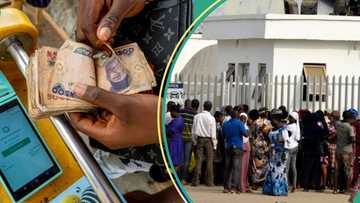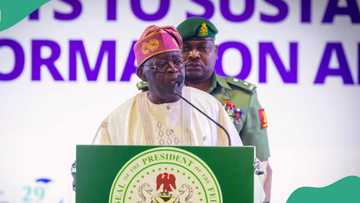“What We Suffered:” How the Naira Redesign Policy Threatened Nigeria’s Economy
- The naira redesign policy of the CBN under former Governor Godwin Emefiele threatened Nigeria’s economic survival
- The CBN had revealed in a press conference that it would redesign N200, N500 and N1,000 notes
- The policy led to painful naira scarcity that caused significant setbacks in the economy
Pascal Oparada has over a decade of experience covering Tech, Energy, Stocks, Investments, and Economy.
On October 26, 2022, the former Governor of the Central Bank of Nigeria (CBN), Godwin Emefiele, jolted many Nigerians with a new policy announcement that would turn Nigeria on its head.
Emefiele, in a press conference, told Nigerians that the CBN was embarking on a currency redesign program, which he said aims to rein in excess cash outside the banking system.

Source: Facebook
Emefiele provides reasons for the naira redesign
The CBN emphasized that the introduction of the new naira designs serves the purpose of combating counterfeiting.

Read also
Senior bank workers give reasons for cash scarcity as POS operators set new withdrawal charges
PAY ATTENTION: Share your outstanding story with our editors! Please reach us through info@corp.legit.ng!
Additionally, the redesign aims to bolster the economy, diminish expenses related to cash management, foster financial inclusion, and amplify the CBN's oversight of the money supply.
Emefiele said:
“Due to persistent challenges that are inundating currency management in Nigeria and undermining our sovereign integrity, the CBN conducted extensive in-house analysis and consultation which suggested the need for a policy to redesign some Nigerian banknotes.”
Emefiele said that the apex bank would redesign the N200, N500, and N1,000 notes and gave January 31, 2023, as the deadline to cease the circulation of old naira notes.
Nigerians’ rush for insufficient naira notes
The CBN likely did not anticipate the level of turmoil that was to emerge when formulating the plan to redesign the naira and mandate the depositing of old naira notes.
The decision by the CBN to withdraw old naira notes in favour of the newly redesigned currency, coupled with the implementation of a cashless policy, resulted in significant challenges for Nigerians, primarily due to the scarcity of the currency.
That was the beginning of chaos and near disaster threatening Nigeria’s economic well-being.
Many Nigerians began the frantic rush to have their old naira notes exchanged for the new ones.
And so began the infamous naira scarcity from January through April 2023 that brought the country to its knees.
Soon after, Nigerians, who found it hard to access cash, began queuing up in banks, ATM points, and, sometimes, sleeping at cash points just to lay their hands on a few naira notes.
Political motives involved
Politicians saw the move as targeting them and their political ambition. Emefiele accused Nigerian politicians of exploiting the situation.
He said:
“The CBN has also noticed that some politicians are buying the new notes and storing them for political purposes.”
CBN mops over N3 trillion from the economy
According to statistics, the CBN mopped up over N3 trillion from Nigerians and allegedly printed N900 billion.

Read also
Expert speaks on naira to dollar exchange rate in 2024 as FG introduces new dollar account charges
The bank encouraged Nigerians to embrace its cashless policy and employ alternative financial transaction channels.
Many banking infrastructures were under pressure as their platforms could not sustain the volume of transactions routed via their channels.
PoS operators reigned as kings
Point of Sale (PoS) operators who could have served as alternatives were also dealing with a shortage of cash.
Many did not have cash to give and the few that had reigned supreme, increasing their charges by as high as 300%.
Interestingly, PoS operators swiftly gained celebrity status overnight, emerging as the primary source for obtaining cash.
However, they took advantage of the situation by engaging in extortion, at times imposing additional charges of up to N1000 for a N5000 withdrawal.
Opay, PalmPay shines during cash scarcity
During that period, transactions through banking applications became more arduous and less dependable, likely attributed to a surge in transaction volumes following the scarcity of physical cash.
During that period, transactions through banking applications became more arduous and less dependable, likely attributed to a surge in transaction volumes following the scarcity of physical cash.
Nigerians voiced profound disappointment and disdain for their financial institutions, previously trusted for smooth transactions.
The implementation of the cashless policy has laid bare the vulnerabilities in Nigeria's banking infrastructure, eroding customer confidence.
The transactional challenges faced by bank customers have, in turn, provided opportunities for alternative platforms like Opay and PalmPay that struggled to attract customers before this period.
They became the preferred platforms for many Nigerians who needed to make urgent bank transactions, providing seamless services.
Protests and attacks on banks
Several customers resorted to using many ATM points as makeshift sleeping quarters.
The situation, initially marked by disorderly queues in banking halls and ATM locations, eventually escalated into widespread protests and the vandalization of some commercial banks' properties in Ibadan, Oyo State.

Read also
FG moves to slash air Peace, Dana others airfares by 50%, gives conditions for travellers to benefit
Reports also indicate additional protests and riots in parts of Ogun State and Edo State, where demonstrators set bonfires and obstructed major roads.
Amidst the ongoing protests, videos surfaced showing customers stripping inside banking halls while demanding the return of their money.
Tensions ran high, leading to conflicts between customers and even altercations with bank staff.
The evident frustration stemmed from the fact that customers were compelled to plead with banks to return their savings, not seeking loans but rather their rightfully owned funds.
Supreme Court intervention fails
The experience was so bad that a few governors took the federal government to the Supreme Court to reverse the deadline given by the CBN for the cessation of the naira notes.
The Supreme Court asked the CBN and the Nigerian government to extend the shelve lives of the naira notes.
Despite the apex court’s ruling, the naira scarcity worsened as many banks began rationing cash over the counter and in ATMs.
Nigeria's gloomy days
The shortage of new naira notes had adverse effects on social life and businesses.
Both workers and business owners faced challenges in obtaining funds to cover the escalated costs of transportation and the purchase of expensive fuel.
Numerous businesses experienced a decline in patronage as customers struggled to access cash for payments for goods and services.
Economist and Financial analyst Chikere Ijeh called the era Nigeria’s gloomy days, describing the policy as ill-thought-out.
He told Legit.ng:
“The policy was excellent, but the motive and execution were foul and dubious. Why embark on such a vast project very close to the election and give such short notice?
“May Nigerians never see the likes of those who brought us to those difficult times."
CBN explains as currency in circulation in Nigeria hits N64.3 trillion in one month
Legit.ng reported that The Central Bank of Nigeria has revealed that the money supply in Nigeria spiked to N64.3 trillion in June 2023, the highest ever recorded in Nigeria.
The amount contrasts with the N55.5 trillion recorded in May, a massive N8.8 trillion increase.
The Data is from the Central Bank of Nigeria, which revealed development in its credit statistics.
PAY ATTENTION: Unlock the best of Legit.ng on Pinterest! Subscribe now and get your daily inspiration!
Source: Legit.ng






